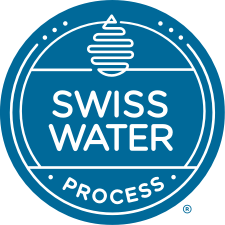Many people wonder if roasting decaf coffees requires significant adjustments from roasting non-decaffeinated coffees. It's a wonderful question that shows a roaster truly cares about offering a tasty decaf to their clientele, and isn't just keeping it on the menu because they feel like they have to. With the advent of convenient, versatile electric sample roasters like IKAWA, the question comes up even more often. We had the opportunity to do some experimentation on IKAWA roasters to share on their website, and the benefits to high-tech sample roasting were immediately obvious.
"One thing that's often overlooked in roasting decaf is that you can do it well," says Mike Strumpf, Swiss Water Senior Director of Coffee. "There's been this idea that you start your roast day with decaf just to warm up the roaster—but there's no reason to do that," assures Mike. Though it may seem obvious to state, paying careful attention to roasting your decaf you will get a better result than if you don't—just like with any other coffee.
"I like to frame decaf roasting as similar to roasting a natural process coffee, because of the processing that happens," explains Mike. "Beans that have undergone our decaf process will move from their endothermic to exothermic state earlier and more aggressively than non-decaffeinated coffees," he explains. "Once the decaf beans are exothermic, you don't want to be adding in too much heat, because you can easily add too much roast flavor really quickly at the end of the roast," he continues. "You find that to be true with a lot of natural processed coffees as opposed to really dense washed coffees which you need to keep pumping heat into or else the roast will stall."

To apply these principles to the IKAWA, our green coffee team took a crack at roasting three of our Swiss Water Small Batch Series decaffeinated coffees, each of which have unique (and delicious!) flavor profiles we're already familiar with exploring. We love the IKAWA for special coffees like these, because the low charge weight means that each roast has less riding on it, and that you will often get multiple roasts out of one sample from a supplier. And though each origin is distinct, the Swiss Water® Process restores all the coffees we decaffeinate to a similar moisture content and water activity, so we expect them to perform fairly similarly.
Stacey Lynden, Cupping Lab Manager, roasted both our Guatemala Los Conejos and our Burundi Rotheca Project Small Batch coffees using a profile she created on an IKAWA Pro100, while Nelson roasted a natural process Ethiopian coffee along with the Los Conejos. Both Nelson and Stacey used the profiles they devised to produce tasty roasts across very different coffees. Nelson went for longer development with a slightly darker roast, and Stacey opted for a lighter roast. But with the versatility of IKAWA's profiling, we're confident a roaster could use Nelson's profile but end it 30 seconds sooner for a similarly delicious, and lighter, result. (You can see more detail, including the profiles they used, on the IKAWA site.)
As coffee geeks, we find the ability to really delve into the data behind our roast profiles with the IKAWA, and share them among peers, to be tremendously exciting. Seeing these innovations applied specifically to decaf makes us even happier, because we know it's going to allow folks at all experience levels of coffee roasting to more easily grasp the nuances of roasting decaffeinated coffees, and elevate their own decaf roasts, making delicious decaf a reality for more people everywhere! Cheers to that!

